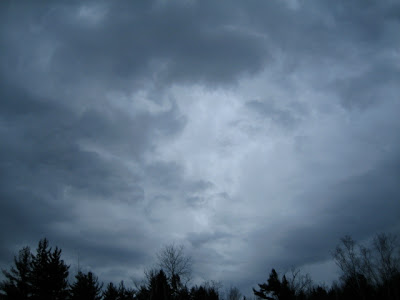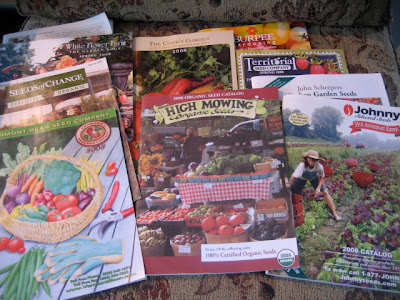
Dear Friend & Gardener
by Beth Chatto & Christopher Lloyd
Published 1998
Nonfiction - gardening letters
This book was my January
2008 TBR (to be read) Challenge choice, and I also read it for the
Garden Bloggers' Book Club, December/January selection. I am so thankful to
Carol for suggesting it. I loved beginning a book about gardening on January 2, and finding that the letters began in January as well. Beth Chatto writes:
January seems to get a lot of people down, in spirit, if not with the sniffles. I have avoided those so far, and your letter has given me a real kick start - just what I needed, and doubtless just what you intended.These letters are the perfect "kick start" for any gardener who is a bit down in the dumps, knowing the gardening season is a long time off.
Reading this book made me feel like a child again, curled up in a chair, listening to the grownups talking. It isn't often now, in my grownup life, that I get to just listen to people. I'm expected to engage, to comment, to be part of the conversation. In the presence of these two great gardeners, I could simply listen and learn. I don't think I've ever put so many page markers and notes (on paper) in a book.

My first question was if the two people were still alive. From what I can gather, Beth Chatto is, though her husband, Andrew, mentioned frequently in her letters as being ill with emphysema, has since died. And Christopher Lloyd, known to his friends as Christo, died two years ago this month. He was almost 85. I felt sad as I read, knowing he was no longer in the world. Yet, I also felt inspired by the great way he lived; still active, full of curiosity, planting, traveling, cooking when he was in his mid-seventies. And the same with Beth Chatto. These are not young people. Their friends are dying, their energies are somewhat diminished, yet they garden hopefully and with all the strength and interest afforded them. What encouragement for those of us still in our twenties, or those nearing our sixties. Just reading their letters gave me faith and hope for my future time in the garden. They were still learning new ideas and trying new plants. Their matter of fact acceptance of aging and change are exemplary. We see Beth's indomitable spirit when we learn that she had become allergic to [touching] most plants by the time she was in her forties. Did she give up gardening? No. She just wears gloves.
There is something special about reading letters, in the way we can enter into someone else's life a little bit. For a while, we can have a "wood" of snowdrops, or hundreds of tulips, or even better, the money to pay a gardener to help us with our chores. We can hear birds that don't live in our area, and see flowers that will not grow where we are. So often as I read, I kept thinking, truly, "
England's green and pleasant land."
Through their letters, we see both the pleasure and the hassle of having gardens which are shared with the general public. They are on view all the time. In the very first letter, Christopher Lloyd says,
To what extent are we gardening for ourselves, for the public or for our plants?I expected the book to talk about just flowers, and was so pleased to read about vegetable gardens, even learning some recipes using those vegetables. I like both types of gardening and often combine them, putting flowers among the vegetables, and tucking a tomato plant in a flower garden. I liked their honesty; the way they wrote about the problems and worries which are so different from mine, yet equally frustrating. I found myself thinking how nice it would be if there were garden magazines that pictured not just perfect gardens, but also showed the crop failures, the impossible weeds, the bug damage. I often feel this way about house magazines. The kitchens are too, too perfect. The living rooms look like no one ever lives in them. I would find it more encouraging, more heartening to see real homes, with possible goals that all of us could work toward. The words of Chatto and Lloyd offer their readers confidence that though we all have imperfect gardens, there is always hope. Of course most of us feel that way anyhow. As soon as August comes, I'm already looking way beyond the late summer weeds and seeing the perfectly weeded rows of next summer. It is great to read of experienced, famous gardeners such as these two, talking about plants they can "no longer be bothered with." I am not a gardener who knows many Latin names, and these two use them pretty frequently, though I wasn't terribly bothered by this. The names of the plants didn't matter to me as much as the gardeners themselves.
And now some phrases that I loved:
Olearia solandri is such a joy both to Fergus [his gardener] and me - every time we walk past it, a great gust of heliotrope scent comes to meet us, interrupting whatever thoughts were running in our minds. CL
One becomes so physically slack in winter. CL
Still, these aggravations occur every year and it's useless to get worked up about them. CL
[May 25]
Weeks pass like days this time of year. BC
Such mornings are rare when everything seems right. You have to make time, to stop and stare. BC
I liked reading about other gardeners I am interested in such as
Sarah Raven and
Alan Titchmarsh. Christopher Lloyd says about the latter that "fame hasn't spoilt him one iota" and "he's always the same warm person who loves a good laugh." Just as I would have expected. Lloyd knew Sarah Raven's father, a Cambridge don, and gardener. She is married to Adam Nicolson, whose grandmother was Vita Sackville-West.
On the back cover of Dear Friend & Gardener, there is a quote from Country Life:
This is a wonderful book, a celebration of friendship, optimism, hard work, gaiety, doggedness, and the possibilities of sudden and unexpected revelation.
Exactly.































